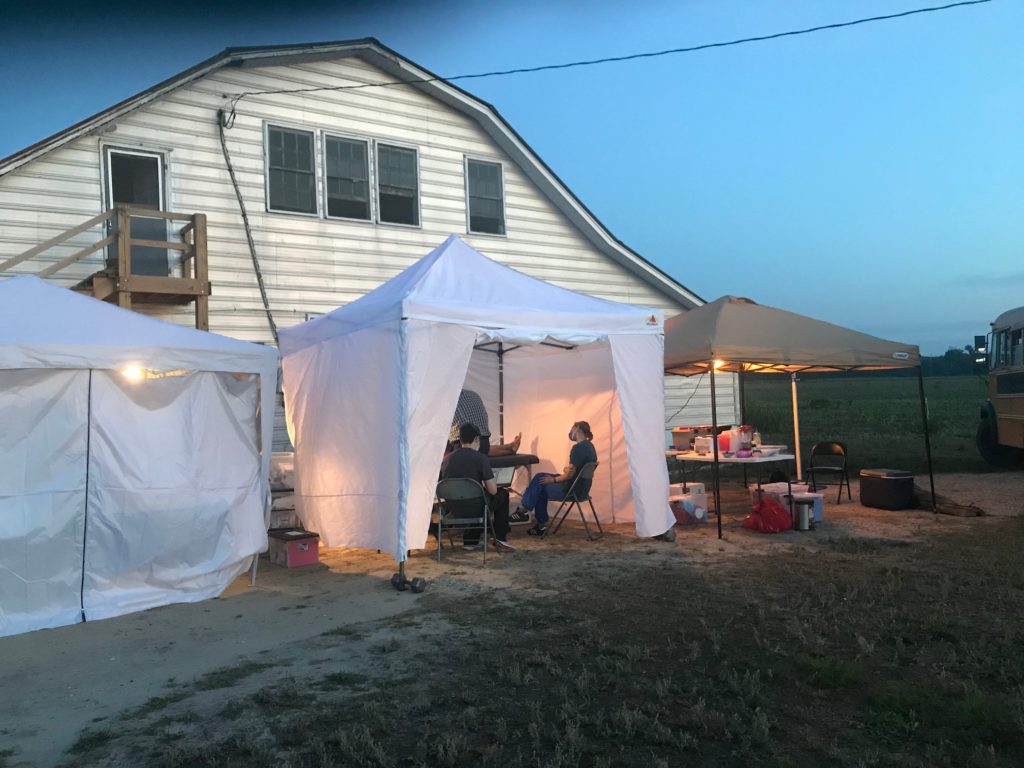What is NCFHP doing for farmworkers during the COVID-19 pandemic?
NCFHP is extremely concerned about the wellbeing of farmworkers during the COVID-19 outbreak and is working at the State level and with our partners on the ground to reduce risks with a focus on prevention, early detection of cases, treatment, and isolation of symptomatic and exposed farmworkers.
NCFHP’s goal is to work with partners to minimize the negative consequences of the COVID-19 pandemic on the health and wellbeing of migrant and seasonal farmworkers, their families and those who work to provide services to this population.

Context
Farmworkers are already working in dangerous conditions and many live in sub-standard housing, with minimal access to health care. As COVID-19 continues to affect our communities, farmworkers face particular challenges in implementing the recommended measures to reduce risk for the virus.
- Farmworkers often live in crowded housing conditions that do not allow for social distancing – this could be a small house with 16 workers or barracks-like housing with up to 100 or 200 workers. Many workers need to share the same bathroom and the same kitchen.
- Farmworkers often have limited access to the supplies they need to protect themselves – masks, cleaning supplies, even the most basic needs such as water and soap.
- Just as is the case with any other illness or injury, there are many disincentives for farmworkers to report they have symptoms of COVID-19 as they fear this could lead to loss of income or losing their job. Farmworkers, who often work 10-12 hours a day 5 days a week, sometimes continue to work without reporting broken bones and life-threatening illnesses for the same reasons. Although most workers should be covered for up to 14 days for leave associated with COVID-19, many are either not aware of this benefit or question if they will actually receive the benefit. Workman’s compensation is an option for workers with an H2A visa but securing this benefit often proves challenging.
NCFHP’s COVID-19 Preparedness and Response
Prevention: NCFHP strives to minimize the risk of exposure to the virus among farmworkers, their family members and those who serve this population through:
- Providing guidance and protocols to assist farmworker health programs in their response efforts.
- Identifying resources for farmworker health programs and growers.
- Identifying, developing and disseminating health education materials for farmworkers and farmers about COVID-19 and prevention measures such as hand washing, social distancing, disinfecting, the stay at home order and isolation of sick and exposed farmworkers.
- Providing information to state and local partners about NC’s farmworker population and the unique needs and considerations related to COVID-19.
Early detection: NCFHP supports testing and response efforts to help with the early detection of cases among migrant and seasonal farmworkers including:
- Providing tools and guidance for farmworker health outreach staff to conduct symptom screening among farmworkers, assisting with local response efforts when cases among farmworkers are identified and participating in state work groups to help prevent and respond to outbreaks.
- Assisting with efforts to isolate sick workers and quarantine exposed workers
Treatment: NCFHP strives to help agencies respond to the needs of farmworkers with COVID-19, by helping to ensure that workers are connected with a primary care resource and encouraging daily monitoring of workers who test positive.
We are supporting farmworker health programs as they find new ways to reach out to farmworkers that help reduce the risk for infection:
- Virtual outreach strategies and new outreach protocols that reduce risk for infection
- Telehealth options instead of mobile clinics
- Securing and training on personal protective equipment when necessary and available
- Virtual case management and health education encounters
- Webinars for farmworker health outreach staff on COVID-19 preparation, response and self-care
We are working closely with the North Carolina Growers Association, NC Agromedicine Institute and the NC Department of Labor to help their members to keep their farmworkers healthy and to respond to any farmworkers with COVID-19 infections. This includes:
- Developing guidelines and sharing resources
- Working within the NC Department of Health and Human Services to help growers find safe isolation housing for infected farmworkers and quarantine housing for exposed farmworkers
- Working within NCDHHS to prioritize testing for COVID-19 for people, such as farmworkers, who are living in congregate housing.
In addition, we are working to increase the number of farmworker labor camps that have reliable internet connectivity to give farmworkers access to timely and lifesaving information in the pandemic and hurricane season, an opportunity to access telehealth services, the ability to stay connected to their families in this stressful time and to stream entertainment to relieve the stress of isolation and quarantine.